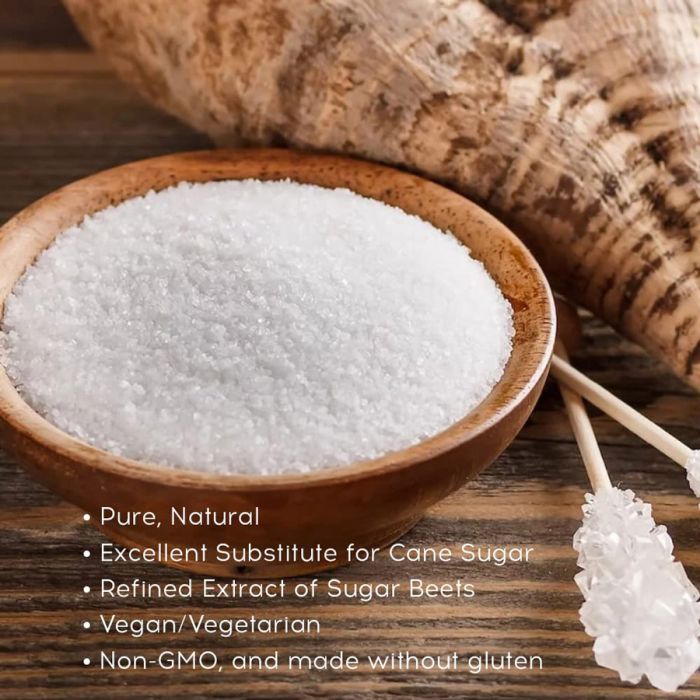In discussions of beet sugar vs cane sugar, the origin of the sugar plays a important role in its characteristics.
Checking Out the Differences in Usages and Advantages In Between Beet Sugar Vs Cane Sugar
In the culinary globe, the option between beet sugar and cane sugar is not merely concerning sweetness but involves a nuanced consideration of taste, application, and influence. While both sugars stem from different plants, each goes through one-of-a-kind production processes that subtly affect their characteristics and viability for various meals.
Beginnings and Manufacturing Processes of Beet and Cane Sugar

Cane sugar, on the other hand, comes from the sugarcane plant, a tropical yard native to Southeast Asia however currently grown in tropical zones worldwide - beet sugar vs cane sugar. The production of cane sugar begins with the harvesting of cane stalks, which are crushed to launch the juice.

Nutritional Content and Health And Wellness Considerations

When contrasting the nutritional web content of beet sugar and cane sugar, it comes to be obvious that both types essentially supply the very same caloric values, with about 16 calories per tsp and no significant nutrient variety. Both sugars, when eaten in excess, can contribute to elevated blood sugar degrees, a danger element for diabetes mellitus and various other metabolic conditions. From a health and wellness point of view, regulating intake of any type of type of sugar, whether from beet or cane, is recommended to prevent these prospective unfavorable effects on wellness.
Taste Accounts and Culinary Applications
Regardless of their comparable chemical structures, beet sugar and cane sugar differ discreetly in flavor, which can influence their use in different cooking contexts. Walking cane sugar usually brings a tip of molasses, even in its polished form, offering a cozy, caramel-like touch that boosts baked products, coffee, and chocolate-based dishes. This slight molasses flavor is particularly valued in the cooking sector for including depth to desserts and breads. On the other hand, beet sugar is identified by its very improved, neutral taste, making it a functional sweetener that does not change the flavor profiles of dishes. This neutrality is especially beneficial in delicate recipes, such as light that site breads, creams, and some sauces, where the integral flavors of other components are planned to attract attention. Cooks and food suppliers might select one kind of sugar over the various other based on the desired flavor result of their cooking developments.
Ecological Influence and Sustainability
While both beet and cane sugars are originated from plants, their environmental effects differ substantially as a result of the distinct approaches of growing and handling needed for each and every. Sugar beet farming typically includes substantial automation, which can boost fossil gas usage and carbon exhausts. Nonetheless, beetroots can be expanded in cooler climates and require less Go Here watering, possibly lowering water use contrasted to sugarcane. Sugarcane, on the other hand, is generally grown in tropical regions where it relies greatly on watering and a longer growing period, increasing its water impact.
In addition, the handling of sugarcane typically produces a significant Read More Here amount of waste, including bagasse, which, although useful as biofuel, frequently adds to air pollution if melted inefficiently. Sugar beet processing utilizes even more of the raw products, leading to less waste. Both markets face difficulties in decreasing their ecological footprints, yet continuous innovations in farming practices and waste administration are intending to improve sustainability.
Economic Factors Influencing the Sugar Market
The financial dynamics of the sugar market are substantially affected by global market demands and trade plans. Variables such as tariffs, subsidies, and worldwide trade arrangements play critical roles fit the competitive landscape. For instance, in areas where sugarcane or sugar beet manufacturing is subsidized, producers may have a monetary benefit that allows them to supply reduced rates on the international market. This can develop variations in profitability and market access for manufacturers in nations without such aids.
Additionally, changes in worldwide demand for sugar, influenced by dietary fads and commercial usage in food products, directly effect prices and production degrees. beet sugar vs cane sugar. Weather likewise play a critical role, as they can significantly influence plant yields and, consequently, the supply chain. This variability presents a level of economic unpredictability that can bring about financial investment volatility in sugar production sectors, influencing decisions from planting to market approach
Final Thought
In verdict, both beet and cane sugar have unique top qualities that fit different cooking requirements. While cane sugar imparts an abundant flavor perfect for improving baked goods, beet sugar's nonpartisanship is ideal for lighter meals. Nutritional resemblances notwithstanding, their distinctive production procedures and environmental influences add intricacy to the option between them. Thus, recognizing these differences aids chefs and consumers make notified decisions that line up with their health, culinary, and moral preferences.